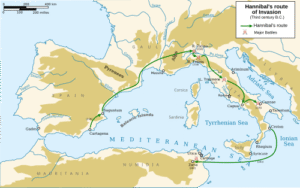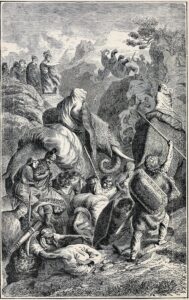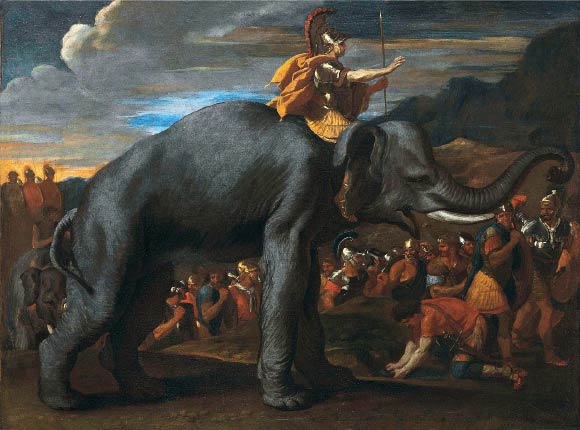Vaša košarica je trenutno prazna!
Few feats in military history capture the imagination quite like Hannibal Barca’s audacious crossing of the Alps. In 218 BC, at the outset of the Second Punic War, the Carthaginian general led an army, including war elephants, through treacherous mountain passes to strike at the heart of Roman territory. This extraordinary undertaking remains a subject of intense debate among historians: was it a brilliant, calculated risk that defied all odds, or a foolhardy venture with catastrophic losses that nearly doomed his campaign before it truly began? Let’s delve into the arguments surrounding one of antiquity’s most legendary maneuvers.

The Strategic Imperative: Why the Alps?
To fully grasp the magnitude of Hannibal’s decision, one must first understand the strategic landscape of the Second Punic War. Rome, having defeated Carthage in the First Punic War, held naval supremacy and controlled the direct land route into Italy via Sicily. Hannibal, a master strategist, knew that a frontal assault was untenable. His goal was to bring the war directly to Roman soil, disrupt their alliances, and force them into a decisive battle on their home turf. A direct sea invasion was out of the question due to Roman naval power. Marching through the Pyrenees and along the Mediterranean coast meant confronting Roman legions head-on and crossing hostile Gallic territories. The Alps offered a path of unexpectedness – a brutal, untamed shortcut that, if successful, promised the element of total surprise. It was a gamble for higher stakes: avoiding a prolonged, attrition-based war of sieges and instead delivering a shocking blow.
The Argument for Genius: A Calculated Surprise
Proponents of the “genius” argument highlight several critical aspects that underscore Hannibal’s strategic brilliance. Firstly, the element of surprise was paramount. The Romans, expecting an attack by sea or a slower overland march through Spain and Gaul, had no defensive preparations in the north. Hannibal effectively bypassed their formidable land and sea defenses by choosing a route they considered impassable for a large army, let alone one with elephants. This allowed him to arrive in Italy unmolested by major Roman forces, gaining precious time to gather Gallic allies.
Secondly, Hannibal’s logistical foresight, despite the immense challenges, was remarkable. He amassed vast supplies, consulted with local guides, and even managed to engineer solutions for navigating seemingly impossible terrain, such as using vinegar to crack boulders obstructing their path. His ability to maintain troop morale and cohesion through unimaginable hardships speaks volumes about his leadership. The psychological impact on Rome, seeing a Carthaginian army and elephants on their side of the Alps, was immense, sowing fear and confusion. This daring feat immediately established Hannibal as a legendary figure and instilled a sense of invincibility early in the campaign.

The Argument for Crazy Risk: A Pyrrhic Crossing
However, the “crazy risk” perspective points to the devastating costs and the sheer improbability of success. The losses suffered during the Alpine crossing were staggering. Estimates vary, but Hannibal’s army reportedly dwindled from around 40,000-50,000 infantry and 9,000-12,000 cavalry to perhaps half that number. Even more acutely, he lost almost all of his elephants, which were intended to be a psychological and tactical advantage in battle. The harsh alpine environment – freezing temperatures, deep snow, treacherous narrow paths, avalanches, and rockslides – proved to be far more formidable than any Roman legion.
Furthermore, Hannibal’s forces faced relentless ambushes from hostile Celtic tribes who viewed them as invaders. These constant skirmishes, combined with the extreme weather and lack of proper supplies, pushed his army to the brink of collapse. Critics argue that such immense losses, particularly of seasoned veterans and crucial animals, severely hampered his ability to capitalize on his initial surprise. Had he faced a well-prepared Roman army immediately after descending the mountains, his depleted and exhausted forces might have been annihilated. The success of the crossing, in this view, was less about genius and more about sheer luck, resilience, and the Romans’ initial underestimation of his audacity.
The Legacy: Was It Worth It?
Ultimately, the question of whether Hannibal’s Alpine crossing was a stroke of genius or a reckless gamble depends on one’s perspective of its overall impact. On one hand, it allowed Hannibal to achieve his immediate strategic goal: to invade Italy and avoid the Roman legions guarding traditional entry points. He arrived in Italy relatively unopposed and was able to secure significant victories at the Trebia, Lake Trasimene, and Cannae, bringing Rome to its knees. The psychological shock and tactical advantage gained from the surprise were undeniable.
On the other hand, the cost in men and materiel was immense, crippling his long-term ability to conduct sustained siege warfare against heavily fortified Roman cities. He never managed to besiege Rome itself, largely due to a lack of proper equipment and a sufficiently large army. The very act of the crossing, while spectacular, may have set the stage for his eventual inability to decisively defeat Rome, forcing him into a prolonged war of attrition he couldn’t win without more substantial reinforcements.
Conclusion: A Testament to Audacity
In conclusion, Hannibal’s crossing of the Alps stands as a testament to unparalleled audacity and military determination. It was, without a doubt, an incredibly risky endeavor, one that defied conventional military wisdom and incurred devastating losses. Yet, it was precisely this audacious risk that allowed him to achieve the element of strategic surprise, fundamentally altering the course of the Second Punic War and bringing the fight directly to Rome’s doorstep.
While the losses were immense, the psychological and tactical advantages gained were equally significant. Hannibal’s Alpine crossing was perhaps both a crazy risk and a masterstroke of genius – a desperate gamble that paid off just enough to achieve its initial objective and cement his legacy as one of history’s greatest military commanders. His march through the mountains remains an enduring symbol of strategic vision and human endurance against overwhelming odds.

